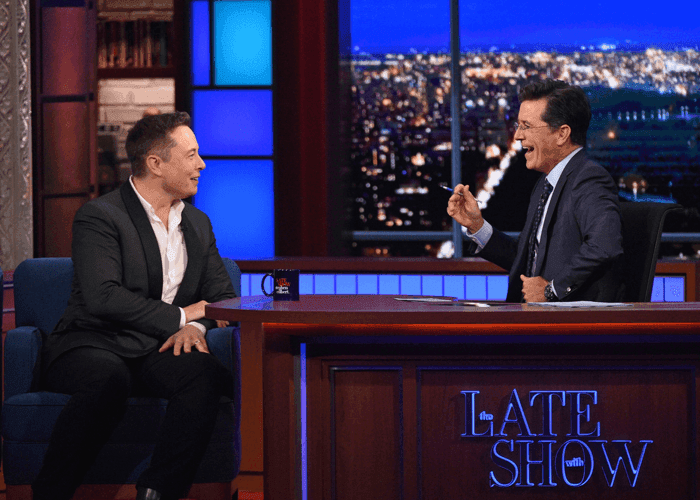Teslas Best Celebrity Evangelist Emerges


Writer at Harbour.Space University
Late Show' host raves about autopilot in six-minute segment Carmaker builds brand for free with love from stars like Oprah Share on Facebook Share on Twitter When “The Late Show With Stephen Colbert” debuted on CBS last month, the host chose Elon Musk, the chief executive officer of Tesla Motors Inc., as one of his first guests. Colbert, who commutes into Manhattan in a Model S sedan, took his enthusiasm for Tesla one step further in an episode last week. He spoke for almost six minutes about his car’s latest autopilot features, the march toward self-driving vehicles and efforts by competitors Apple, Google and Uber. “I love my Tesla -- it’s so fast, it’s all electric,” he told viewers. Comparing his car to a laptop computer on wheels, he said that with the company’s latest over-the-air software update, “Tesla owners woke up to find their cars could drive themselves.” That glowing Colbert report shows how Tesla benefits from celebrity enthusiasm -- for free, from customers who include Oprah Winfrey -- to promote the brand. Throw in some viral Internet clips, test drives and customer referral programs, and Tesla is able to spend money on developing products instead of on marketing. In stark contrast to other automakers, Tesla doesn’t currently pay for traditional media such as television, radio or print advertising or celebrity sponsors. “The Colbert segment was amazing because it was so long, it was Colbert, it was Colbert’s new show and instead of being playfully sarcastic he was overwhelmingly positive,” said Lincoln Merrihew, senior vice president of client services for Millward Brown Digital in Boston, who first watched the Colbert clip on YouTube. “The magic of a celebrity evangelist is that they love a product so much that they will talk about it for free. It was more than a simple endorsement; it was more like a commercial.” That air time is valuable. On average, 30-second spots on the “Late Show” will average $38,400 from Colbert’s debut through the end of the fourth quarter, according to media-cost forecaster SQAD LLC. It helps, of course, that the 44-year-old Musk is a brand and a celebrity in his own right -- making him a worthy guest -- as well as a deft user of social media. Stock Decline At the moment, Tesla can use a little extra fan love. Its once high-flying stock has fallen to earth in the wake of last month’s long-awaited introduction of the company’s Model X sport utility. Three analysts have cut their price targets amid concerns that Tesla, which aims to deliver at least 50,000 vehicles this year, faces a steep production ramp in the fourth quarter. On Tuesday, the Model S lost its recommendation from Consumer Reports after owners complained about quality issues as mundane as a squeaky sunroof to major issues like the electric motor needing to be replaced, the publication said in its forthcoming December issue. The Consumer Reports news sent shares tumbling 6.6 percent to $213.03, its biggest drop since Aug. 6. Musk has pushed back on Consumer Reports via Twitter, saying the publication’s reliability survey “includes a lot of early production cars. Already addressed in new cars.” Fan Power The auto industry already is also legend with celebrity ads, from Matthew McConaughey’s oft-parodied commercials for Lincoln to Clint Eastwood’s two-minute “It’s Halftime in America” spot for Chrysler, a hit of the 2012 Super Bowl. For Tesla, the celebrities do the work on their own accord, not for a paycheck. Stars such as actress Alyssa Milano, director Jon Favreau and Teller, the silent partner in the magic duo Penn & Teller, have praised Tesla or promoted the brand to their social-media followers in an increasingly fragmented media market. Teller’s “customer story” is one of several that can be read in full on Tesla’s website. Oprah shared photographs of her recently purchased white Model S with her millions of followers on Instagram and Twitter. Colbert talked in detail about autopilot -- a Tesla product announcement -- just as it came out. “On a daily basis, Stephen brings a smart comedic voice to all types of topical issues,” said CBS in a statement. “We don’t tell him what to say, but we certainly enjoy it.” Automotive Advertising Other automakers usually have to rely on traditional marketing. General Motors Co., Ford Motor Co. and Fiat Chrysler Automobiles NV all rank among the top 10 advertisers in the U.S. in terms of money spent, according to Advertising Age. In 2014 alone, GM spent almost $1.7 billion on advertising in the U.S., according to Kantar Media; Ford spent $841 million, and Fiat Chrysler spent $1.1 billion. Those figures are just from the manufacturers and don’t include the vast millions that dealerships spend as well. In its annual report filed earlier this year, Tesla notes that “we have been able to generate significant media coverage of our company and our vehicles, and we believe we will continue to do so.” But the Palo Alto, California-based company also notes that “to further promote our brand, we may be required to change our marketing practices, which could result in substantially increased advertising expenses.” For now at least, Tesla’s strategy is working. “Colbert benefits from talking about Tesla, because it’s a brand that his millennial audience associates with,” Milton Pedraza, CEO of the Luxury Institute, said in an interview. “It’s a massive multiplier effect that is equivalent to spending tens of millions of dollars on media. Tesla doesn’t advertise: They are playing the game of not playing the game, and you win by that. They are doing it brilliantly.”
Thanks for reading
If you’re interested in further growth, take a look at our website to learn what your future could look like at Harbour.Space. Lastly, get in touch with us at hello@harbour.space to let us know your thoughts!
